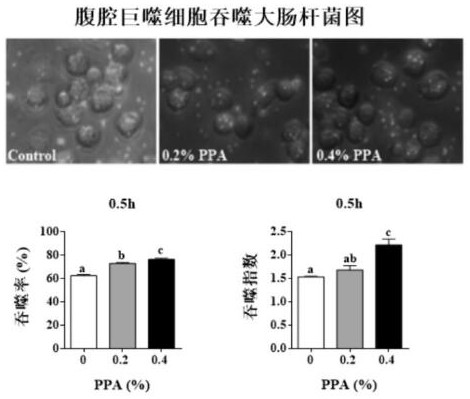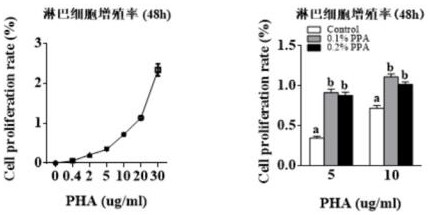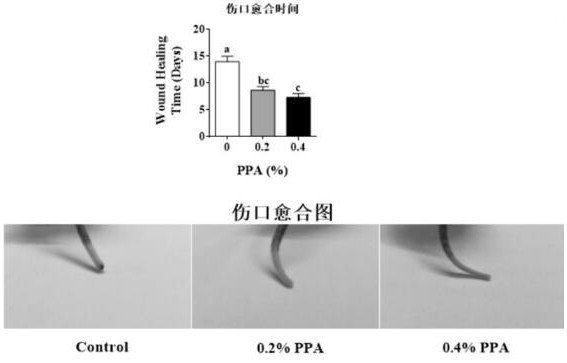Application of phenylpyruvate in the preparation of immune enhancer
A technology of phenylpyruvate and pharmacy, which is applied in the application field of phenylpyruvate in the preparation of immune enhancers, can solve problems such as adverse effects, and achieve the effects of less addition, high physiological activity, and no adverse side effects
- Summary
- Abstract
- Description
- Claims
- Application Information
AI Technical Summary
Problems solved by technology
Method used
Image
Examples
Embodiment 1
[0049] Example 1 The effect of adding phenylpyruvate on the phagocytic ability of mouse peritoneal macrophages in common diet
[0050] 1. Experimental method
[0051]In order to study the effect of phenylpyruvate on the immune function of mice, C57BL / 6J male mice were used as the research object, divided into 3 groups (1 control group and 2 treatment groups), reared in a single cage, and the number of repetitions was 8 , fed the mice with common diets supplemented with 0% (control group), 0.2% and 0.4% phenylpyruvate, respectively, and carried out the test of phagocytosis of Escherichia coli in vitro by mouse peritoneal macrophages after 6 weeks. Specific steps include:
[0052] (1) Collection of primary mouse peritoneal macrophages: Wipe the operation table and pipette gun with alcohol cotton to prevent contamination by bacteria. Filter the HBSS (Hank's Balanced Salt Solution, Hank's Balanced Salt Solution) solution with 5% serum for later use, kill the mice by neck disloca...
Embodiment 2
[0057] Example 2 Effect of Adding Phenylpyruvic Acid to Common Diet on Mouse Spleen Lymphocyte Proliferation
[0058] 1. Experimental method
[0059] In order to further study the effect of phenylpyruvate on the immune function of mice, C57BL / 6J male mice were used as the research object, divided into 3 groups (control group and 2 treatment groups), reared in a single cage, and the number of repetitions was 8 , fed the mice with common diets supplemented with 0% (control group), 0.1% and 0.2% phenylpyruvate, respectively, and carried out spleen lymphocyte proliferation test after 6 weeks. Specific steps include:
[0060] (1) After the mice were killed by neck dislocation, they were soaked in bromogeramine solution until they were soaked, and then they were taken out. The spleens of the mice were dissected, separated, transferred to a small beaker containing a small amount of Hanks solution, washed for 2 to 3 times, and then placed in On the cell sieve in the plate, use a gri...
Embodiment 3
[0065] Example 3 Common Diet Added Phenylpyruvate to the Effect of Mice on Wound Healing Ability
[0066] 1. In this experiment, by studying the effect of phenylpyruvate on tail wound healing of mice, it is used to illustrate the change of phenylpyruvate on the immune function. The specific test method is:
[0067] (1) In the experiment, C57BL / 6J male mice were used as the research object, divided into 3 groups (control group and 2 treatment groups), reared in a single cage, and the number of repetitions was 8. Added 0% (control group), 0.2 % and 0.4% phenylpyruvate were fed to mice in normal diet.
[0068] (2) Subtract the tissues 1mm away from the tail tip of the mice in the two treatment groups and the control group. In order to ensure that the wound surface of the tail tip of each mouse is as similar as possible, the scissors are cut perpendicular to the cut surface to form an incision wound. And the wound is disinfected with iodine and alcohol after the wound is formed....
PUM
 Login to View More
Login to View More Abstract
Description
Claims
Application Information
 Login to View More
Login to View More - R&D
- Intellectual Property
- Life Sciences
- Materials
- Tech Scout
- Unparalleled Data Quality
- Higher Quality Content
- 60% Fewer Hallucinations
Browse by: Latest US Patents, China's latest patents, Technical Efficacy Thesaurus, Application Domain, Technology Topic, Popular Technical Reports.
© 2025 PatSnap. All rights reserved.Legal|Privacy policy|Modern Slavery Act Transparency Statement|Sitemap|About US| Contact US: help@patsnap.com



